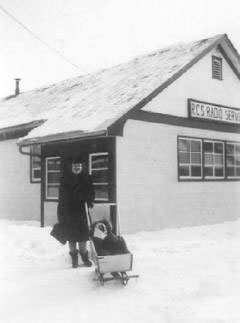The following is a reprint of an article from the Klondike Sun, August 8th, 1997 edition.
by Dan Davidson
Sun Staff
The first legal home of CFYT was the Royal Canadian Signals office, shown here in the late 1940s. Photo by Bill Bushell
These days Dawson City has access to several radio stations and a pretty good range of television stations as well. But in the late 1940's, when Bill Bushell had just arrived here, this was not the case.
"This was a dead town for radio," said Bushell when he visited here recently. The 79 year old former Signalman and his son arrived in mid-July to fulfill a 47 year of ambition to revisit their old home. "Nobody could get anything here by radio."
Now, in the later 1940s, radio was still the king of broadcast entertainment, and its public face was all that we now think of in terms of television: news shows, dramas, musical variety, situation comedies, networks marketing their programs all over North America. None of that was available in Dawson City just after the Second World War.
Bushell and his cronies at the signal corps offices on Front Street changed all that, but not without getting into a spot of trouble along the way.
A Bushell recalls it one of his mates, Chuck Grey, had a room on the second floor of the Pearl Harbour Hotel. Grey had obtained one of the new 45 rpm record players and a one watt transmitter.
"We hooked up the record player to the transmitter, dropped a wire from his bedroom window onto one of the avenues and we put it on the air."
They knew it worked because they were able to pick up the new broadcast at the signal office. The range was small; it would reach all of Dawson proper but not as far as the nearby community of Bear Creek.
"We just said, 'This is Dawson City Radio.' We didn't give ourselves a call sign then. 'We are operating on a frequency of about 1450 on your dial. We hope you enjoy the music.'" Then they sat back and waited for people to take notice. They didn't have long to wait.
"Gee whiz, the switchboard lit up and it wasn't long before we were getting all kinds of calls for Dawson Radio at our signal station, which wasn't where Chuck was."
Grey's hotel room soon became a Mecca for youngsters who wanted to see how the trick was done. There was Chuck, sitting on his bed, the record player on his night table, a small transmitter beside it and a wire running out his window. Humble beginnings indeed for the little station that was to be the forerunner of the CBC Yukon as well as the local CFYT-fm and every other station in the territory.
Bushell recalls that sales of radios in the town skyrocketed, even though the broadcasts were irregular and hadn't a lot of variety early on. But doom nearly struck the experiment before it could get any further.
"Some silly nut went and snitched on us to the department in Ottawa and we got a very nasty letter from our bosses to cease and desist -- take this clandestine machine off the air and throw it in the Yukon."
So that was what they had to do.
"We announced on the air that we were taking it off the air because we'd been ordered to by the federal government. So we said 'Good-bye Dawson' and we went off the air."
Citizens' action began immediately to restore the makeshift entertainment. Pressure was put on the federal government by local politicians and the Chamber of Mines and the edict was withdrawn.
Not only that but Ottawa shipped out a 100 Watt transmitter to install up by the cemeteries where the Signal Corps transmitter was located. A technician was sent to check out the installation and run remote lines to an unused room in the signals building.
"Soon we were on air properly and legal and they wanted to know what call sign we wanted. So we sat down, talked it over and came up with CFYT." Which meant Canadian Forces Yukon Territory.
The name continued until the station folded in the 1960s and was picked up again by a new generation when the Dawson City Community Radio Society was formed in 1982.
The bulk of the airplay in those days came from stacks of American Armed Forces Radio programming on sixteen inch transcription disks that ran about a half hour each. It was a simple matter to slip back and change a record from time to time, though they did have to be careful.
"Our Warrant Officer became a little annoyed with us as it seemed we were spending more time on the entertainment than on our business."
The young CFYT also inaugurated a tradition of live broadcasts which its descendent, DCTV, carries on to this day. Today the live fare is council meetings, debates and public meetings. Then, they alternated church services from Saint Paul's and Saint Mary's and played disk jockey at dances which were held at the community hall (which later became Diamond Tooth Gerties Casino).
CFYT and the joy of early being a radio pioneer was one of the memories that Bushell left behind when he moved in 1950. He was pleased to see that his call sign and the tradition of volunteer broadcasting still lingers on in Dawson.
Our thanks to the Klondike Sun for this article
Return to Message Centre
